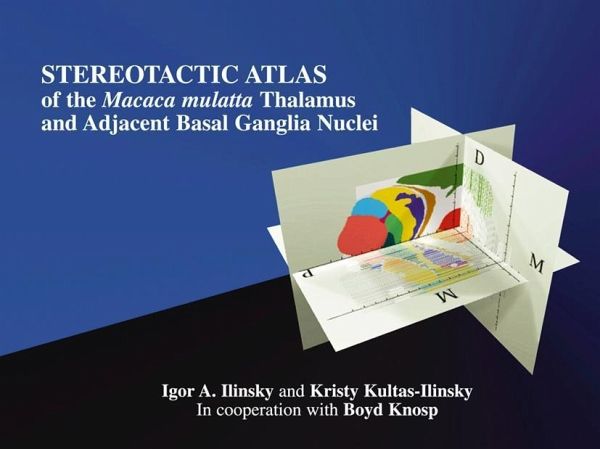
Stereotactic Atlas of the Macaca Mulatta Thalamus and Adjacent Basal Ganglia Nuclei
Sagittal Cytoarchitectonic Plates with Maps of the Outlined Nuclei and Their Computer Reconstructions in the Coronal and Horizontal Planes Within the Intracerebral Coordinate System
Versandkostenfrei!
Versandfertig in über 4 Wochen
93,99 €
inkl. MwSt.

PAYBACK Punkte
47 °P sammeln!
The thalamus is the last frontier in brain research. It is the least studied region, most likely because it is very complex. The thalamus and basal ganglia are better characterized in nonhuman primates, and this information can be extrapolated to the human thalamus. This atlas can be used for identification of the thalamic nuclei in neuroanatomical, neurochemical, and neurophysiological studies and for guiding probes into the target nuclei during stereotactic surgery in nonhuman primates. The atlas consists of two parts: (1) a book with approximately 30 representative sagittal histological pla...
The thalamus is the last frontier in brain research. It is the least studied region, most likely because it is very complex. The thalamus and basal ganglia are better characterized in nonhuman primates, and this information can be extrapolated to the human thalamus. This atlas can be used for identification of the thalamic nuclei in neuroanatomical, neurochemical, and neurophysiological studies and for guiding probes into the target nuclei during stereotactic surgery in nonhuman primates.
The atlas consists of two parts: (1) a book with approximately 30 representative sagittal histological plates corresponding to nuclear outlines and identification; and (2) an interactive CD-ROM containing approximately 85 color-coded maps. The CD-ROM serves to enhance the images in the book by showing three-dimensional interrelationships between the different planes.
The atlas consists of two parts: (1) a book with approximately 30 representative sagittal histological plates corresponding to nuclear outlines and identification; and (2) an interactive CD-ROM containing approximately 85 color-coded maps. The CD-ROM serves to enhance the images in the book by showing three-dimensional interrelationships between the different planes.












